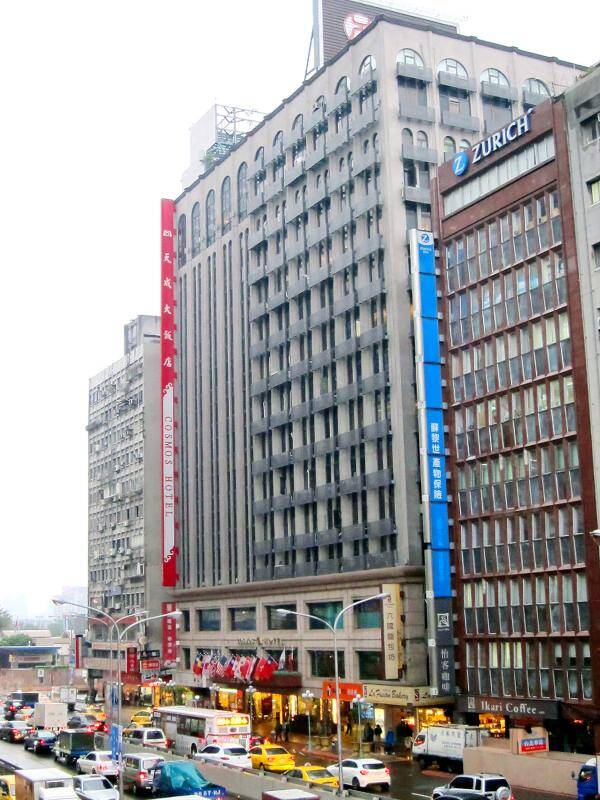Domestic hotel operator Cosmos Hotel & Resorts Group (天成飯店集團) yesterday said its business has recovered almost to pre-pandemic levels and might continue to improve, as people resume social gatherings and vacations.
The group, which operates Cosmos Taipei (台北天成大飯店) near Taipei Railway Station, Taipei Garden Hotel (台北花園大酒店) near Ximen MRT Station, Sun Dialogue Hotel (繪日之丘) in Chiayi City and Grand Cosmos Resort Ruisui (瑞穗天合) in Hualien County, has rapidly emerged from the pandemic restrictions, similar to its peers.
“Room occupancy rates, and food and beverage sales have returned almost to pre-pandemic levels,” marketing and communications head Blithe Chao (趙芝綺) said.

Photo: Wang Yi-hung, Taipei Times
However, the number of Japanese travelers is still below the levels before the pandemic began in 2020, she said.
The number of foreign tourists visiting Taiwan reached 2.7 million in the first quarter of this year, an increase of 2 million from the same period last year.
Japanese and South Korean travelers accounted for most of the visitors, government data showed.
The average room occupancy rate at the nation’s tourist hotels was 56.41 percent, an annual increase of 15 percent, while daily room rates rose 12.83 percent to NT$4,775, the Tourism Bureau said.

PROTECTION: The investigation, which takes aim at exporters such as Canada, Germany and Brazil, came days after Trump unveiled tariff hikes on steel and aluminum products US President Donald Trump on Saturday ordered a probe into potential tariffs on lumber imports — a move threatening to stoke trade tensions — while also pushing for a domestic supply boost. Trump signed an executive order instructing US Secretary of Commerce Howard Lutnick to begin an investigation “to determine the effects on the national security of imports of timber, lumber and their derivative products.” The study might result in new tariffs being imposed, which would pile on top of existing levies. The investigation takes aim at exporters like Canada, Germany and Brazil, with White House officials earlier accusing these economies of

Taiwan Semiconductor Manufacturing Co (TSMC, 台積電) would not produce its most advanced technologies in the US next year, Minister of Economic Affairs J.W. Kuo (郭智輝) said yesterday. Kuo made the comment during an appearance at the legislature, hours after the chipmaker announced that it would invest an additional US$100 billion to expand its manufacturing operations in the US. Asked by Taiwan People’s Party Legislator-at-large Chang Chi-kai (張啟楷) if TSMC would allow its most advanced technologies, the yet-to-be-released 2-nanometer and 1.6-nanometer processes, to go to the US in the near term, Kuo denied it. TSMC recently opened its first US factory, which produces 4-nanometer

Teleperformance SE, the largest call-center operator in the world, is rolling out an artificial intelligence (AI) system that softens English-speaking Indian workers’ accents in real time in a move the company claims would make them more understandable. The technology, called accent translation, coupled with background noise cancelation, is being deployed in call centers in India, where workers provide customer support to some of Teleperformance’s international clients. The company provides outsourced customer support and content moderation to global companies including Apple Inc, ByteDance Ltd’s (字節跳動) TikTok and Samsung Electronics Co Ltd. “When you have an Indian agent on the line, sometimes it’s hard

‘SACRED MOUNTAIN’: The chipmaker can form joint ventures abroad, except in China, but like other firms, it needs government approval for large investments Taiwan Semiconductor Manufacturing Co (TSMC, 台積電) needs government permission for any overseas joint ventures (JVs), but there are no restrictions on making the most advanced chips overseas other than for China, Minister of Economic Affairs J.W. Kuo (郭智輝) said yesterday. US media have said that TSMC, the world’s largest contract chipmaker and a major supplier to companies such as Apple Inc and Nvidia Corp, has been in talks for a stake in Intel Corp. Neither company has confirmed the talks, but US President Donald Trump has accused Taiwan of taking away the US’ semiconductor business and said he wants the industry back